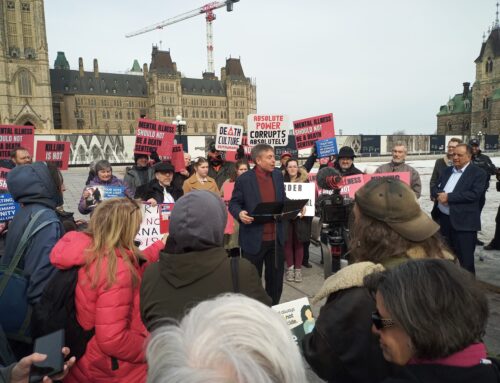Euthanasia is “an act of respect to an incurable patient…to a dignified last act of medical care.” – Dr. Pieter Admiraal, Euthanasia pioneer, Holland.
In the autumn of 1989, the season of new beginnings, the homes and offices of pro-life people are buzzing with plans for the coming year. We talk of the Daigle case and its enormous implications; of Operation Rescue’s providential success; of the increasing U.S. challenge to Roe v. Wade and its potential impact in Canada. It is only fitting, now that our children have opened their books again and look to their own future, that we should recommit ourselves to the future of those children yet to be born.
Yet in other homes, offices, and classrooms, a different kind of planning is taking place. It, too, has its eye on the future. It, too, involves committed men and women with definite views about human life. And it, too, has as one of its principal goals the changing of Canadian law to reflect those views. The topic is euthanasia. The agenda is language.
“Is a person in a persistent vegetative state a person?” – William Harvey, Univ. of Toronto Subject Supervisor, “Human Values in Medicine”
In primitive societies, power is achieved through physical force. In today’s information age, however, the way to power is through the use – and particularly the control – of language.
The manipulation of language has become virtually an art form. Madison Avenue led the way 50 years ago with the creation of needs unknown until then. But today we have moved beyond general cynicism about any public statement. We live in a kind of jaded stupor in which we not only do not mind if we are lied to, but are even willing to accept the lie as a ‘relative’ truth as long as it doesn’t inconvenience us too much.
For years we have seen the cold-blooded workings of this manipulation in the pro-abortion movement. There is no need to belabor here what everyone already knows: how ‘pro-life’ has been twisted to mean ‘anti-choice’; ‘counseling’ to mean ‘harassment’; ‘passive resistance’ to signify ‘violent confrontation.’
But this ear of words has been waged on the street, with each new turn of phrase thrown together quickly in the heat of battle, just in time to make the morning paper. The results are often sloppy and melodramatic.
But gathered quietly on the dusky outskirts of Canadian society, in informal reflective meetings and academic study sessions, the proponents of euthanasia are making no such mistakes. They know perfectly well that Canadians are not yet ready for their message. So they spend their time wisely, laying their foundation well.
This foundation is language. Marshalling it to serve their cause is essential to its success. Language, and nothing else, will cause the walls of resistance to crumble to the ground and open the way for complete popular acceptance of euthanasia. Let’s take a look at how this is being done.
Can’t we view God “as a compassionate innkeeper, who gives his residents the right to check out whenever they want to?” – Dr. John Arras, Ethics Advisor to Montfiore Medical Centre, N.Y.
The most important word in the new euthanasia vocabulary is ‘dignity.’ Most Canadians have had enough experience with death to lead them to believe that there is something undignified about the way we race to a hospital in an ambulance a person who is perfectly ready to die, wire him to expensive life-support systems, isolate him in an intensive care unit, allow him to sink into drugged unconsciousness, then agonize over whether to remove this support and allow him to die ‘naturally.’
Arguing that this kind of death is not dignified, the proponents offer as an alternative the apparently harmless phrase ‘good death,’ which of course is the literal translation of ‘euthanasia.’ Having introduced this word to signify something reasonable and desirable, they can state the first truth as follows:
“Euthanasia is a valid alternative to an inhumane, undignified death.”
As a result, the organization representing the Canadian euthanasia movement becomes ‘Dying with Dignity.’
But euthanasia in this sense lacks substance. The next step is to add the element of choice. “With the advances of medical knowledge and technology,” reads the Dying with Dignity literature, “there have arisen new and even more agonizing fears and realities…Technology can extend existence when there is no hope of recovery and the patient wishes to die.”
“What is it about life that is sacred – biological vitality or some kind of quality? And who determines the quality…?” – Rev. Phyllis Smyth, Chaplain, Royal Victoria Hospital, Montreal
This wish to die is enshrined in the doctrine of autonomy – of free choice over matters affecting oneself. This is an attractive principle for those having no higher authority than their own free will. Whether such an authority exists does not enter into the reasoning process. The second truth can thus be stated:
“You have a fundamental right to choose a good death (euthanasia).”
Note, by the way, that in euthanasia circles dignity precedes choice – that is, the final end is dignity; the means is choice. This is a much more persuasive argument than that of the pro-abortionists, who in the absence of any compelling reason for abortion are forced to rely almost exclusively on the argument from choice alone.
The next step is to persuade the sympathetic reader or listener to “enforce your own legal rights to ensure more control over your own health care.” This argument begins with a reminder that “all individuals in Canada already possess the right to refuse medical treatment,” and urges the adoption of a ‘living will’ and a ‘durable power of attorney’ to enforce this right. But quickly moves to matters covered under the Criminal Code of Canada, encouraging the signing of a ‘euthanasia declaration,’ whose provisions are unenforceable anywhere in the world except Holland.
The third truth is thus formulated:
“You have the right to control your own health care, including voluntary euthanasia; and to lobby for legislative change where voluntary euthanasia is prohibited by law.”
After laying the foundation of these three fundamental principles, the euthanasia proponents can begin erecting a secure superstructure. Suffering becomes “undignified.” Human life becomes measured according to “cognitive and affective function.” Respect for life is transformed into “respecting someone’s right to make his own decisions.” Assisting in suicide means assisting with “self-deliverance” or giving someone “the gift of peace.” Providing nourishment through nasogastric or gastrostomy tubes is defined as “extraordinary medical treatment.” And euthanasia itself becomes “the last act of terminal care.”
We need not “seek to remove the fatal pathology…if the efforts would not enable the individual to achieve cognitive-affective function and strive for the purpose of life.” Kevin O’Rourke, Catholic Ethicist (Writing in America)
It is significant that some words and phrases are not used. Although Dying with Dignity is affiliated with Right-to-Die societies in the United States and in other countries, such a life would be unacceptable in Canada, where for now our rights and responsibilities still have some balance.
Nor would we be comfortable with Derek Humphry’s National Hemlock Society, Doris Peter’s Common Sense Suicide, or Ann Wickett’s book on couple-suicide, Double Exit. Those with an ear to the Canadian “market” know that this is not the place to use these terms. There are other, quieter ones, more in keeping with our predisposition for law, order, and self-effacement. Given time, patience, and careful planning, these will win the battle for euthanasia here, just as other words and phrases are winning it elsewhere.
“We are all God’s Children, and God doesn’t want us to suffer.” – Rev. M. Pippy, Chaplain Seven Oaks Hospital, Winnipeg
Who are these people who methodically lay the language – foundation of euthanasia? They are not fanatical death-dealers, hoping to put a bottle of pills by every patient’s bedside and a syringe in every doctor’s hand. They are not hostile to religion, although they recognize the Church as their greatest enemy. They are not even particularly afraid to die.
They are for the most part well-educated, highly competent professionals (doctors, nurses, educators, etc.). They are aware that something has gone terribly wrong with our terminal care system, and are terrified of the inevitable loss of autonomy which will one day place them at its mercy. They are sincerely compassionate, wanting by any means to spare themselves and their loved ones the agonies they have witnessed or heard about.
And although it is obvious, it should be mentioned that most of them face this problem without faith in a loving God. For them, suffering is the ultimate cosmic absurdity, and avoiding such a fate occupies a good deal of their time and energy.
And so, convinced that only complete health care freedom – including the option of euthanasia – can save them from a cruel death (or, as one of them has said, from a “meaningless, useless life”), they spend their time quietly discussing, analyzing, proposing, and reworking. They know what they are doing. They are sure that, if they present their case in the right words at the right time, they will win the day. Their arguments, by anticipating all possible pro-life objections, may be perceived as more rational and balanced than the fierce opposition they will generate.
“The final two decisions dealt with patients having severely diminished mental capacity for whom the provision of nutrients and fluids was of questionable benefit.” – L.J. Nelson, Ph.D., J.D., Division of Medical Ethics, University of California
They may distract Church leaders with convincing “difficult cases,” over which moral theologians may worry themselves to death. They may convert politicians with the results of poll indicating that 75% of their constituents are in favor of “choice” in this matter. And when the inevitable euthanasia case is tried before the Supreme Court of Canada, they may win it on the basis of their careful research of the Canadian Charter of Rights and Freedoms.
But these are victories for the future. Today, they work to gather all the data, to stuffy all the legal possibilities, to assess the weaknesses of their opposition, and especially to develop a terminology which will have no weak points when the time comes to join battle in earnest.
And so, with infinite patience, they make certain that their weapons of language are sharp and precise, not only so that they can easily deflect the arguments we are likely to fire back at them, but more importantly, because they know that victory goes to those prepared for the fight, and because they know with absolute certainty which side is better prepared.




